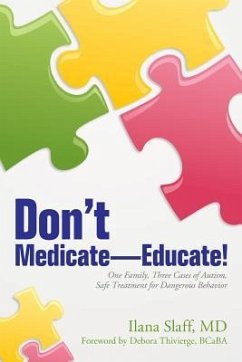Dr. Slaff writes about her personal and professional involvement in autism. She discusses her identical twin brothers' and daughter's life-threatening behaviors-one requiring surgery-and how her brothers' different residential placements have made them so different. She discusses the controversy of aversive skin shock, a research-based treatment that saved her brother's life. She describes the dangers of psychotropic medications, particularly for individuals with developmental disabilities, and how her brothers experienced devastating side effects. She examines how medication is frequently substituted for behavioral educational interventions. She talks about termination of services after individuals turn twenty-one. She writes about her own experiences treating individuals with developmental disabilities. She discusses her advocacy with school districts and other government officials and what must be done to improve services. She makes recommendations to parents to identify and obtain the treatments their loved ones need. Excerpts from Don't Medicate-Educate! Many individuals are not receiving the educational therapies they need, including applied behavior analysis, so their behaviors are not under control. Many end up needing residential placements and chemical and physical restraints just so no one gets hurt. The chemical restraints, as shown in my brothers' experiences, do not always work to stop the danger. One of the reasons for the system's reliance on chemical restraints is risk aversion: if a patient displays dangerous aggression or suffers a self-injury when behavioral therapies are not available, the doctor can be sued for malpractice for not prescribing medication or other treatment. The first four chapters discuss my personal experiences with my family members who have autism and the struggles to obtain effective treatment. The book discusses how one brother has been doing well with effective treatment, while his twin has done poorly. It also discusses effective treatment for my daughter. To determine if a treatment is effective or dangerous requires research. In chapter 5, I discuss published research on positive-behavior treatments, aversives, and psychotropic medications used to treat individuals with autism or other developmental disabilities. The discussion includes specific risks to individuals with autism and developmental disabilities in general. I also discuss what is actually being implemented in real-life settings and advocating for evidence-based treatment. Recommendations to improve access to effective interventions are discussed in chapter 6. In the appendix, I have included a history of evidence-based treatments utilized in autism to familiarize readers to topics discussed throughout this book. FROM KIRKUS REVIEW In Slaff's debut book, a psychiatric chronicle that straddles the genres of memoir, case study, and position paper, readers learn the story of one woman's struggle to care for family members with autism. They also discover what that effort has taught her about medicine, politics, education, risk, and the necessity "to seek my own answers and not blindly follow others." After this affecting opening, in which the doctor and sister whom readers have come to admire sees her "nightmares of having a child with autism" come true, the book becomes a detailed support manual for people undergoing the same trials and a thoroughly researched testimonial to the effectiveness of aversive therapy. The lucid work also delivers a short, useful history of the ways that therapy has been misused (as a treatment for homosexuality) and mischaracterized (in reports by Geraldo Rivera and Connie Chung). "People do not choose to have autism or any other disability, but we can choose to love and take care of them," the author reminds readers. She proves herself a fine exemplar of this care and love in this engrossing and persuasive work.








